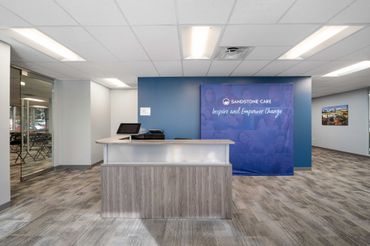
Drug & Alcohol Rehab Centers near Denver, CO
When it comes to finding treatment for substance use disorder in Denver, Colorado, it’s crucial to acknowledge the significance of seeking treatment and understanding payment options before taking that crucial first step toward recovery.
Treatment Centers near Denver, CO

All Treatment Centers near Denver, CO
Are You Covered For Treatment?
- Colorado Springs Rehabs
- Aurora Rehabs
- Pueblo Rehabs
- Littleton Rehabs
- Fort Collins Rehabs
- Boulder Rehabs
- Englewood Rehabs
- Commerce City Rehabs
- Wheat Ridge Rehabs
Information About Rehab in Denver
Latest Reviews
Latest Reviews of Rehabs in Colorado
Sobriety House, Inc.
They let me work day labor on the weekends. I have been Clean & Sober for 25 years. They had a 3/4 house where I could rent an apartment and had a meeting there once a week for my aftercare treatment. I have been sober since leaving the program. The program taught me that there was another way of life that included Prayer and Meditation. 1 of my counselors taught me how to meditate and how to grow Spiritually. I had to get rid of my old ideas about what I thought about Religion and to choose a God that I wanted in my life.
Denver CARES Detoxification and Drug and Alcohol Rehabilitation
Dedicated staff, organized. Not enough funding, recidivism seems to be high. This is a great facility for those who cannot afford traditional rehab services. It's efficient and organized with very dedicated staff.
The Raleigh House of Hope
Without any exaggeration, I fully believe that Raleigh House is the reason why I have a future, and a good one at that. I hope every person struggling with addiction finds the help they need, and I know they can find it at Raleigh House if they look for it. They helped me rebuild my mind and body, and they helped me identify what was really driving my addiction, so I can continue to work on my demons in the real world without the complications of alcohol destroying my life.
Area Information
Denver, with its stunning natural landscapes, vibrant culture, and diverse population of over 700,000 residents,1 offers a unique blend of urban living and easy access to outdoor adventures, making it an enticing place to call home. Nestled at the base of the Rocky Mountains, Denver boasts a rich tapestry of experiences, from the bustling city life to the tranquil mountain getaways. The population is a melting pot of backgrounds, ensuring a community that’s welcoming and inclusive. The city’s diverse neighborhoods and thriving cultural scene provide a nurturing environment for those on the journey to recovery, fostering a sense of belonging and support.
Substance Misuse and Addiction in Denver, Colorado
Substance abuse and addiction represent significant challenges within the Denver community. According to data from the Colorado Health Institute, between 2017 and 2018, a notable 11.9% of individuals aged 18 and above in Colorado disclosed experiencing a substance use disorder in the preceding year, surpassing the national rate of 7.7%.2
Drug and Alcohol Rehab
Rehabilitation programs offer a wide array of options and approaches to address addiction, ensuring that individuals receive the necessary support tailored to their unique journey towards recovery. Addiction is a complex challenge, and the road to recovery is rarely one-size-fits-all. Therefore, drug and alcohol rehab is designed to be flexible and comprehensive.
What Happens in Drug and Alcohol Rehab?
Drug and alcohol rehab encompasses multiple stages of treatment, including detox, inpatient care, outpatient services, and aftercare, recognizing the diverse and individualized paths to recovery that each person may undertake. By providing a continuum of care, treatment facilities aim to meet individuals where they are on their recovery journey and provide the necessary guidance and support as they progress towards a healthier, substance-free life.
Detox Programs
Detox programs are a crucial starting point for many individuals on their path to recovery. These programs are medically supervised and often incorporate the use of medications to alleviate withdrawal symptoms associated with various substances. Detox is a pivotal phase as it helps the body rid itself of harmful substances and sets the stage for further treatment.
How Long Is Detox in Rehab?
The duration of detox typically spans from 3 to 7 days, but this timeline can vary depending on factors like the substance of abuse and the individual’s overall health. It’s important to recognize that detox is just the beginning of the journey, and continued treatment is vital to maintain lasting recovery.
Inpatient Drug and Alcohol Rehab
Inpatient drug rehab programs play a pivotal role in the healing process. Since therapy is the cornerstone of treatment within these programs, treatment specialists employ a variety of therapeutic interventions, including group therapy, individual counseling, and holistic approaches, to support patients in their recovery journey. Inpatient programs offer a structured environment where individuals can focus solely on their recovery, free from external distractions. These programs are typically available in 30, 60, or 90-day durations, depending on the specific needs and progress of each individual. The longer duration programs allow for a more comprehensive and immersive approach to treatment, addressing not only addiction but also any co-occurring mental health disorders.
Outpatient Drug and Alcohol Rehab
Outpatient drug rehab programs provide individuals with the necessary tools for aftercare and relapse prevention. Patients learn strategies for maintaining their recovery while continuing with their daily lives, such as work or family commitments. These programs are designed to be flexible, allowing individuals to access support while still participating in their daily responsibilities. The flexibility of outpatient programs can be particularly beneficial for those who have completed inpatient treatment and are transitioning back to their regular routines.
How Much Does Rehab Cost?
The cost of rehab can often feel like a substantial financial burden. It’s understandable that the financial aspect of treatment can be a significant source of concern, but it should not be a deterrent to seeking help. It’s important to be aware of the various options available to make treatment accessible and affordable, such as:
- Payment Plans
- Government Grants and Scholarships
- Free Rehab
- State-Funded Rehab
Does Insurance Cover Drug and Alcohol Rehab?
Many insurance plans do cover at least a portion of the costs associated with rehab, making treatment more affordable for those seeking help. Rehab insurance helps to alleviate the financial burden and ensure access to necessary care. Widely accepted insurances include:
Finding The Best Rehab Center
Denver, Colorado Drug and Alcohol Rehab Facilities
When looking for treatment facilities, you can use our rehab locator tool to find nearby options. While staying in-state can be suitable for some, many experts recommend going out of state for treatment to minimize distractions and increase the chances of a successful recovery journey. Our locator tool can assist you in finding the most suitable treatment facility, whether that’s in Colorado, or a different state. The priority is finding a treatment environment that best aligns with your unique needs and goals for recovery.
Sources
- United States Census Bureau. Denver, Colorado. July 1, 2022.
- The Colorado Health Institute. Colorado Health Access Survey. July 2020.






























